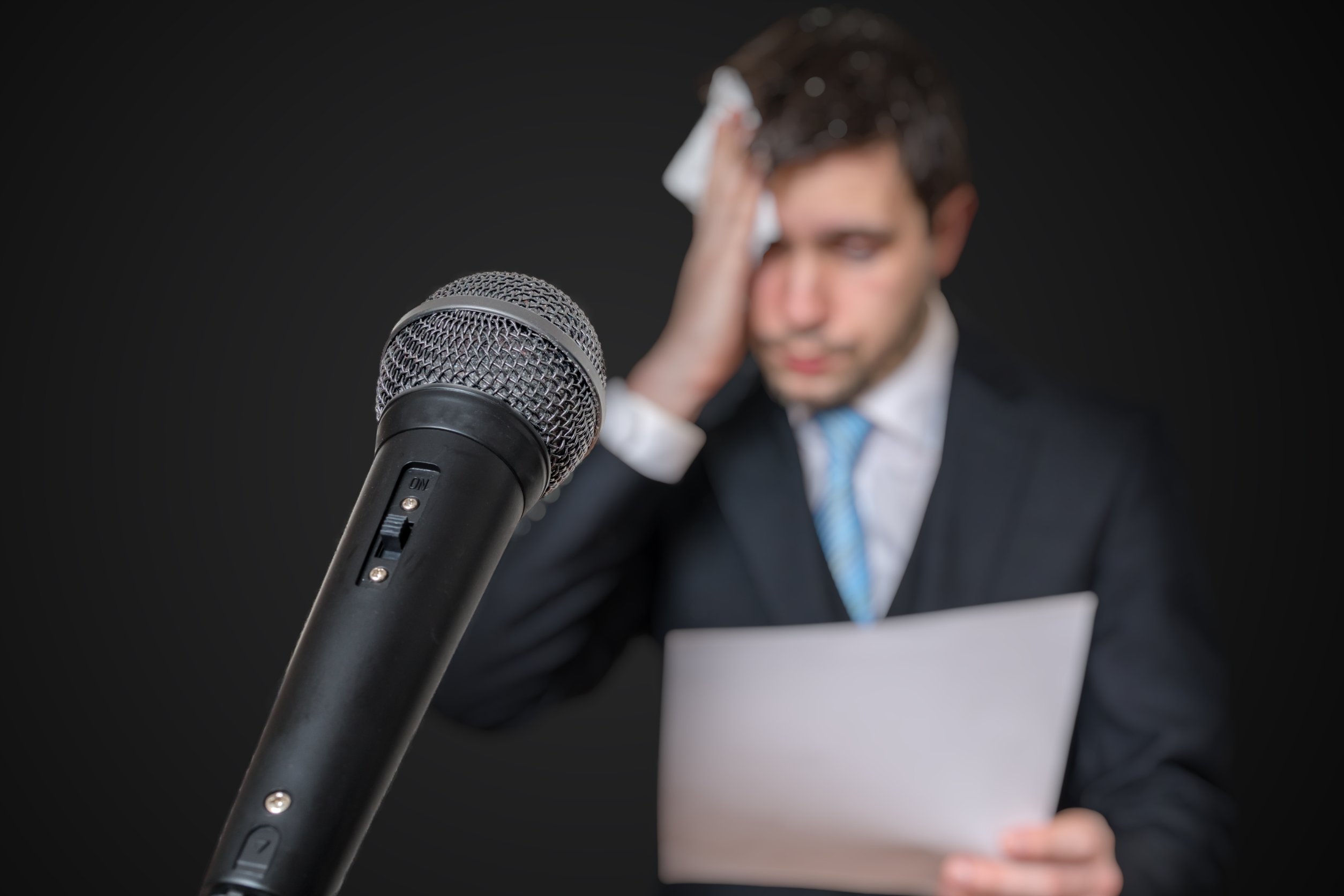What Causes Glossophobia? (Ways to overcome included)
Public speaking is often listed as one of the most common human fears—sometimes even ahead of death. This intense fear, known as glossophobia, affects millions of people worldwide. But what exactly causes this fear? And more importantly, how can it be overcome?
Glossophobia is caused by a combination of psychological, emotional, and situational factors such as fear of judgment, past traumatic experiences, negative thought patterns, social anxiety, lack of preparation, and evolutionary survival instincts related to being the center of attention.
In this comprehensive guide, we’ll explore what glossophobia is, what causes it, and science-backed ways to overcome it, including proven methods like Cognitive Behavioral Therapy (CBT) and gradual exposure techniques.
What Is Glossophobia?
Glossophobia is the medical term for the fear of public speaking. Derived from the Greek words “glossa” (tongue) and “phobos” (fear), it describes the anxiety or panic that arises when an individual is required to speak in front of others—whether that be in a formal presentation, a casual meeting, or even a social setting.
This fear isn’t just a minor inconvenience. For many, it becomes a crippling phobia that prevents them from pursuing career advancements, engaging in social events, or sharing their ideas publicly.
Glossophobia Symptoms: More Than Just Nerves
People with glossophobia experience a range of psychological and physical symptoms, including:
- Sweating – Excessive perspiration before or during speaking.
- Trembling – Shaky hands, legs, or voice.
- Rapid heartbeat – Pounding or racing heart.
- Dry mouth – Lack of saliva making speech difficult.
- Nausea – Feeling sick or uneasy in the stomach.
- Shortness of breath – Difficulty breathing or catching your breath.
- Dizziness – Feeling lightheaded or faint.
- Mental block – Mind going blank or forgetting what to say.
- Muscle tension – Tightness in neck, shoulders, or jaw.
- Avoidance behavior – Skipping events or meetings to avoid speaking.
- Overthinking – Obsessing over possible mistakes or negative outcomes.
- Stuttering – Disrupted flow of speech.
- Panic attacks – Intense episodes of fear with physical symptoms.
- Blushing – Face turning red when speaking.
- Restlessness – Fidgeting or inability to sit still before speaking.
In severe cases, glossophobia can resemble panic disorder, creating high levels of anxiety and distress even at the thought of speaking.
What Causes Glossophobia? How to Overcome?
Glossophobia doesn’t have one singular cause—it’s often the result of multiple psychological, emotional, and situational factors. Here’s a closer look at the key causes of glossophobia and the ways to overcome them effectively:

1. Evolutionary Origins
Humans evolved in tribes, where being the center of attention could imply threat or exile. Speaking in front of a group may still trigger a primal survival fear.
How to Overcome: Reframe your mindset. Remind yourself that public speaking today is a tool for connection, not a threat. Practice visualization and gradual exposure to reduce primal fear responses.
2. Diverse Social Triggers
Glossophobia isn’t limited to formal presentations—it can be triggered in meetings, social events, or informal discussions where one might be asked to speak.
How to Overcome: Start small. Speak in low-pressure environments, then gradually expose yourself to more challenging settings to build tolerance and confidence.
3. Fear of Judgment or Embarrassment
A major driver of glossophobia is fear of being judged, ridiculed, or appearing incompetent in front of others.
How to Overcome: Focus on your message, not yourself. Most people are more interested in what you’re saying than how you’re saying it. Use CBT techniques to challenge and reframe self-critical thoughts.
4. Negative Thought Patterns
People with glossophobia often anticipate the worst: “I’ll forget my lines,” “I’ll look stupid,” or “They’ll laugh at me.”
How to Overcome: Practice cognitive restructuring. Replace irrational fears with empowering affirmations like, “I am prepared, and I can handle this.”
5. Childhood Trauma or Ridicule
Many people trace their fear back to early life experiences, like being laughed at during a class presentation or scolded for speaking incorrectly.
How to Overcome: CBT and therapy can help uncover and heal these root causes. Reframing past experiences and building new, positive ones is key to recovery.
6. Social Anxiety Disorder
Glossophobia often overlaps with social anxiety, where the individual fears being watched, judged, or embarrassed in any social situation.
How to Overcome: Techniques like mindfulness, deep breathing, and progressive exposure help. If symptoms are severe, consult a mental health professional.
7. Lack of Preparation or Skills
Sometimes, the fear stems not from trauma but simply from inexperience. If you’re unprepared, even a confident person may become anxious.
How to Overcome: Join public speaking clubs like Toastmasters, practice in front of mirrors or friends, and improve your skills through training and feedback.
8. High-Stakes Pressure
When the stakes are high—like a job interview or a business pitch—fear can increase due to the pressure to perform perfectly.
How to Overcome: Focus on progress, not perfection. Prepare thoroughly, but give yourself permission to make minor mistakes. Even the best speakers fumble occasionally.
9. Fear of Forgetting (Memory Slips)
Many people fear “going blank” mid-sentence, which adds pressure and increases the likelihood of it actually happening.
How to Overcome: Use cue cards, outlines, and visual aids. Memorize key points, not scripts. Practice improvisation to boost confidence in handling unexpected moments.
10. Physical Symptoms Reinforcing Fear
The body’s stress response—trembling, sweating, nausea—can reinforce the fear, creating a vicious cycle.
How to Overcome: Learn relaxation techniques like box breathing, progressive muscle relaxation, or guided meditation before speaking.
11. Cultural or Societal Expectations
In some cultures, there is immense pressure to speak fluently and confidently, making even small mistakes feel unacceptable.
How to Overcome: Embrace your own speaking style. Authenticity is more powerful than perfection. Remember, audiences value connection over polish.
CBT: The Gold Standard for Overcoming Glossophobia
What is Cognitive Behavioral Therapy (CBT)?
CBT is a research-backed therapeutic method that helps individuals identify and challenge irrational thoughts, reframe negative beliefs, and develop healthier behaviors.
How CBT Helps with Glossophobia:
- Identifies core beliefs (e.g., “I’m not good enough to speak publicly”)
- Reframes traumatic experiences (e.g., childhood ridicule)
- Provides coping strategies for anxiety
- Introduces gradual exposure therapy to speaking situations
- Replaces self-doubt with positive affirmations and evidence-based confidence
Example: A person afraid of giving a toast due to a past failure may work with a therapist to dissect that memory, understand the exaggeration in their fears, and rebuild a more empowering narrative.
More Proven Ways to Overcome Glossophobia
Here are practical strategies you can implement:
- Practice Frequently: The more you practice, the more confident you’ll feel. Record yourself and watch it to improve delivery.
- Join a Speaking Group: Organizations like Toastmasters provide a safe, supportive environment to practice regularly.
- Prepare Thoroughly: Know your material inside out. Preparation breeds confidence.
- Rehearse Realistically: Practice under conditions similar to the actual event. If you’ll be standing, don’t rehearse sitting down.
- Use Visualization: Visualize yourself succeeding. Imagine the audience clapping, not criticizing.
- Control Breathing: Deep, slow breathing reduces cortisol and helps steady your nerves.
- Positive Self-Talk: Replace “I can’t” with “I’ve got this.”
- Seek Professional Help: A therapist can offer customized strategies for your specific situation.
Frequently Asked Questions
What is the trigger of glossophobia?
Triggers include speaking in front of groups, large or small, in both social and formal settings—even if you’re not required to speak. Anticipation alone can cause anxiety.
Is glossophobia a panic disorder?
Yes, in severe cases, glossophobia can escalate into a panic disorder, causing extreme physical and emotional symptoms when facing or anticipating public speaking.
Can glossophobia be prevented?
Yes, through early exposure, building self-confidence, and CBT therapy, it’s possible to prevent the development of intense glossophobia or manage it before it worsens.
Why do I get nervous speaking in public?
The fear is often rooted in judgment, past embarrassment, lack of practice, or social anxiety. It’s your brain’s way of trying to protect you—but it can be retrained.
Final Thoughts: You Can Overcome Glossophobia
Glossophobia is common but conquerable. Whether it stems from deep-seated trauma, a lack of experience, or a fear of judgment, there are clear, evidence-based strategies to help you move beyond it.
Through cognitive behavioral therapy, regular practice, and gradual exposure, anyone can transform from a nervous speaker into a confident communicator.
Remember: You don’t have to be perfect to be powerful. Your voice matters—start using it.obia, individuals can work towards a more confident and comfortable approach to public speaking. With the support of therapy and techniques like CBT, the fear of speaking in front of others can be managed and eventually conquered.

